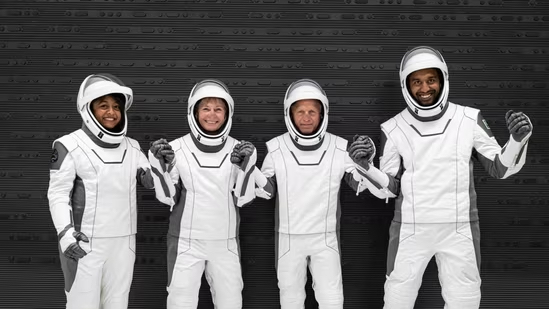An historic event unfolded as a private rocket embarked on a significant mission to the International Space Station (ISS), carrying the first Arab woman astronaut. Rayyanah Barnawi, a respected breast cancer researcher from Saudi Arabia, joined forces with fellow Saudi, Ali al-Qarni, a skilled fighter pilot, for this momentous journey. This marks the first time in decades that Saudi astronauts have ventured into space.
The launch took place on Sunday at 5:37 PM local time (21:37 GMT) from the Kennedy Space Center at Cape Canaveral in the southern United States. Aboard the SpaceX Falcon 9 rocket, Barnawi and al-Qarni embarked on their mission. Accompanying them are Peggy Whitson, a former NASA astronaut embarking on her fourth flight to the ISS, and John Shoffner, a businessman from Tennessee serving as the pilot.
The team’s capsule is expected to reach the space station on Monday morning, and they will spend just over a week conducting their work before returning home with a splashdown off the coast of Florida. Following their successful launch and settling into orbit, Barnawi expressed her exhilaration, saying, “Hello from outer space! It feels amazing to be viewing Earth from this capsule.”
Barnawi’s journey to space has been sponsored by the Saudi government, and she considers it a great pleasure and honour to be the first Saudi woman astronaut. Apart from her excitement about the research she will conduct aboard the ISS, she eagerly anticipates sharing her experience with children. She believes it will be thrilling for them to witness astronauts from their own region for the first time.
Al-Qarni, a career fighter pilot, has always harboured a passion for exploring the unknown and admiring the sky and stars. He views this mission as a tremendous opportunity to pursue his long-held passion and possibly soar among the stars.
These two astronauts from Saudi Arabia hold the distinction of being the first from their country to journey into space since a Saudi prince flew aboard the space shuttle Discovery in 1985. Coincidentally, they will be welcomed at the station by an astronaut from the United Arab Emirates.
This mission marks the second private flight to the space station organised by Axiom Space, a Houston-based company. The previous mission, conducted last year, involved three businessmen and a retired NASA astronaut. Axiom Space plans to add its own modules to the station within the next few years, eventually creating a standalone outpost available for hire.
The exact cost of the 10-day mission, sponsored by Saudi Arabia and John Shoffner, the Tennessee businessman, has not been disclosed by Axiom Space. However, the company had previously indicated a ticket price of $55 million per person.
After years of refraining from space tourism, NASA now embraces it, with plans for two private missions per year. The Russian Space Agency has intermittently engaged in space tourism for decades.
Joel Montalbano, NASA’s space station program manager, expressed the agency’s commitment to expanding its activities in low-Earth orbit worldwide. He stated, “Our job is to expand what we do in low-Earth orbit across the globe.”
Following liftoff, SpaceX’s first-stage booster successfully landed back at Cape Canaveral, providing a special treat for the spectators present, including around 60 Saudis.
Matt Ondler, representing Axiom Space, summed up the momentous day, saying, “It was a very, very exciting day.”







